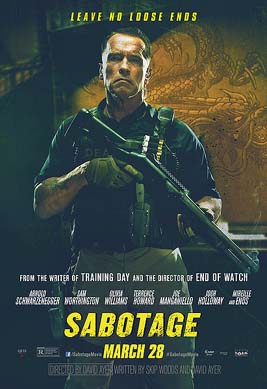HOMAGE TO BRUTAL MASCULINE MOVIES MADE BY THE LIKES OF DE PALMA, PECKINPAH, HILL
 Alonso Duralde, The Wrap:
Alonso Duralde, The Wrap:"Nothing really gets sabotaged in Sabotage, unless you're counting the career of director David Ayer, who got some of his best reviews to date for End of Watch just two years ago. Apparently forgetting everything he knows about filmmaking in the intervening months, he's delivered up a schlocky and semi-incoherent shoot-'em-up, the most notable factor of which is a torrent of fake blood that rivals the gallons of Karo syrup Brian De Palma sprayed over Scarface.”
"Arnold Schwarzenegger has defended 'brutal violence' in movies ahead of his new film Sabotage, in which the 66-year-old plays the head of a special unit of the US Drug Enforcement Administration (DEA) whose members are viciously killed and mutilated after a cartel bust.
"Schwarzenegger, the former Governor of California, said: 'It's a bit of an homage to the films that I grew up on, and directors like Brian De Palma, and Walter Hill and Sam Peckinpah who made very brutal kind of masculine movies. I think violence is political now: "maybe if there is no violence in movies, there will be no violence in the world." I don't believe that. The video games our children play are much, much more violent than anything in this movie.'"
"The results are deliberately off-putting, a nasty film about mean people doing horrible things. That’s surely by design. Ayer is trying to paint a broad portrait of the poisonous effect this never-ending conflict has on its combatants, and to make a movie that mirrors its protagonists’ fractured psyches. Like Wharton’s DEA unit, Sabotage gets off on the adrenaline rush of badass brutality—but feels traumatized by its aftermath.
"That jibes perfectly with late-career Schwarzenegger’s onscreen persona, the man overwhelmed with grief and regret. Action heroes have rarely killed more people onscreen than Ahnuld—or done so while completely dismissing the emotional weight of those killings by delivering shamelessly goofy puns while committing murder. But as viewers slowly realize over the course of the film, John Wharton has witnessed the effect of violence first-hand, and it’s scarred him. That almost makes Sabotage Schwarzenegger’s (much less effective) version of Clint Eastwood’s Unforgiven—his chance to wrestle with all the death he’s perpetrated onscreen, and to consider, once and for all in his twilight years, whether it was really worth it. The film’s final scene—one of the most fascinating of Schwarzenegger’s entire career—makes the Eastwood comparison even more overt, turning Wharton into something of a Western cowboy."
Updated: Saturday, March 29, 2014 4:37 PM CDT
Post Comment | View Comments (1) | Permalink | Share This Post



